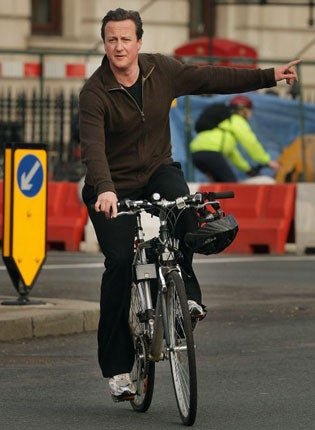Outrage at ruling on helmets for cyclists
Judge says bare-headed cyclists may be to blame if they are injured in a collision

Britain's cyclists reacted in uproar yesterday to a High Court ruling that they can be blamed for their injuries if they don't wear a helmet – even if the accident itself was caused by someone else.
"There can be no doubt that the failure to wear a helmet may expose the cyclist to the risk of greater injury," Mr Justice Williams said, making the unprecedented ruling on an accident involving a motorbike and a cycle in Brightlingsea, Essex in June 2005.
"A cyclist is free to choose whether or not to wear one," he said in the legal ruling. But not doing so means "any injury sustained may be the cyclist's own fault and 'He has only himself to thank for the consequences'."
The national cyclists' organisation, CTC, said yesterday that it was considering taking legal action to overturn the "wrong and ill-informed" decision; other advocates of cycling described it as "absolute rubbish" and "sad".
The case involved cyclist Robert Smith, then a 51-year-old NHS manager, who was riding without a helmet to an opera group rehearsal when he was hit by Michael Finch's motorbike. He suffered serious brain injuries. The judge decided that the motorcyclist was "entirely" to blame for the crash because he had been going too fast and had ridden too close to Mr Smith's bicycle. He also dismissed Mr Finch's suggestion that Mr Smith's injuries were caused by his failure to wear a helmet. But the judge established the principle of "contributory negligence" for cyclists who ride without a helmet, citing a 1976 court ruling by Lord Denning in relation to seatbelts and advice in the Highway Code.
Roger Geffen, campaigns and policy manager for the CTC, said there was significant doubt about whether helmets increased cyclists' safety. After a law requiring helmets to be worn was introduced in Western Australia, the number of cyclists dropped by a third but head injuries fell by just 10 per cent.
Mr Geffen said CTC was investigating ways of overturning the ruling. "The judge didn't have any evidence before him about the effectiveness of cycle helmets," he said. "It just seems he has exceeded his remit.
"It's a kind of creeping compulsion by the back door and it leaves cyclists in a state of uncertainty. There's a feeling you might have to wear a helmet because you are legally at risk.
"What we know overall is that wherever helmet-wearing has increased, it hasn't improved cycle safety. We certainly feel the ruling is wrong and ill-informed. We need legal advice."
A spokesman for the Department for Transport said the Government had commissioned research on cycle safety, which would look at the effectiveness of helmets and report back in September 2010.
The former shadow transport secretary, Bernard Jenkin MP, whose North Essex constituency includes Brightlingsea, said he would raise the High Court ruling – which was made in January but only came to light yesterday – with the Government. Mr Jenkin, deputy chairman of the all-party cycling group, said: "The judge is clearly not a cyclist and he's exhibiting all the prejudices of someone who does not regularly use a bicycle." Dr Ian Walker, a Bath University psychologist, carried out a study which found passing motorists tended to give a cyclist without a helmet a wider berth than one wearing one. He said it was "quite strange" that the judge had set a precedent for a situation which did not apply to the accident he was considering.
Join our commenting forum
Join thought-provoking conversations, follow other Independent readers and see their replies
Comments
Bookmark popover
Removed from bookmarks